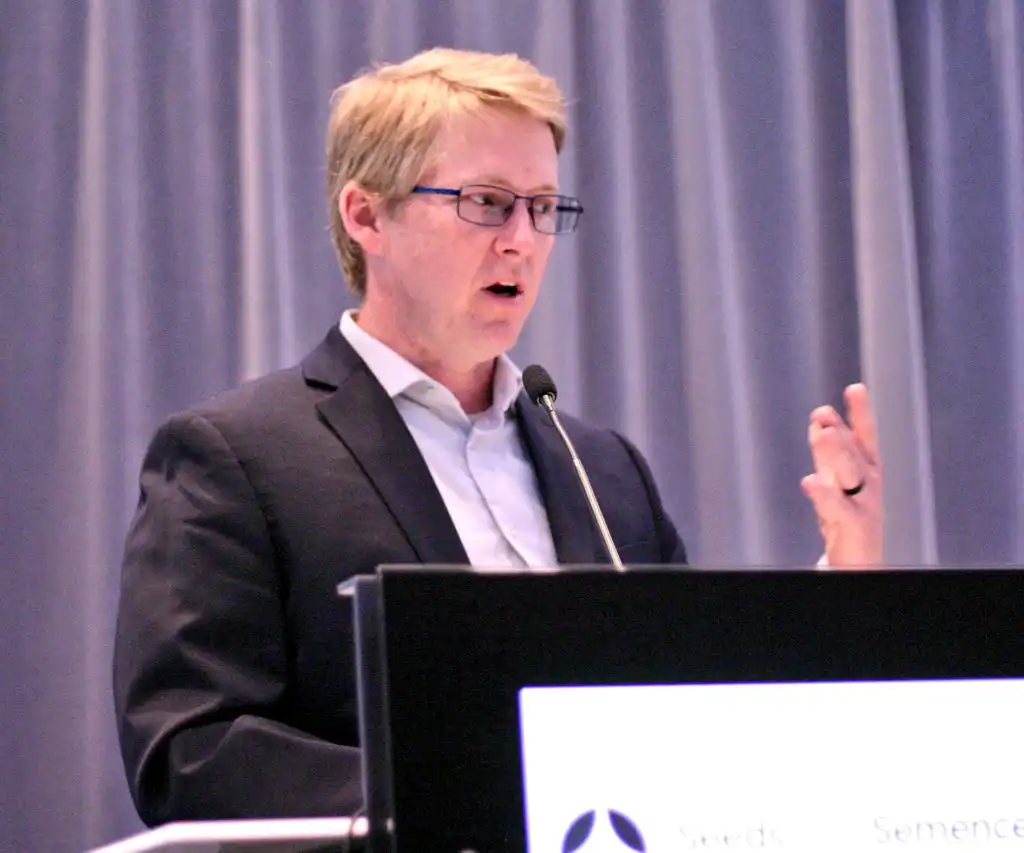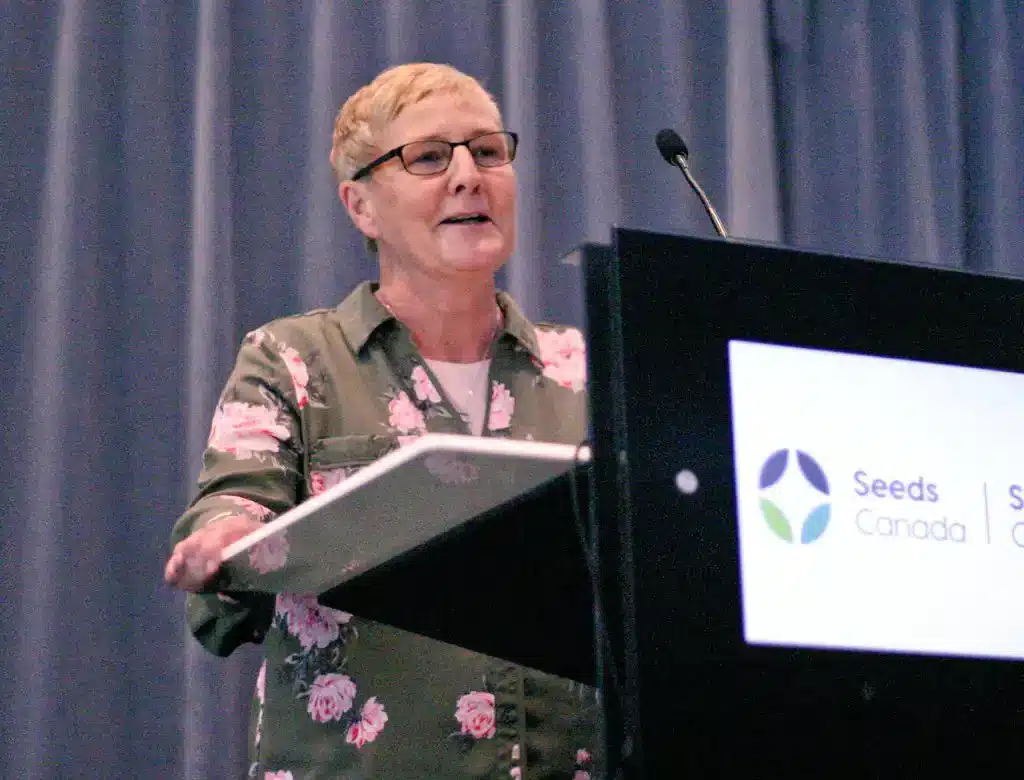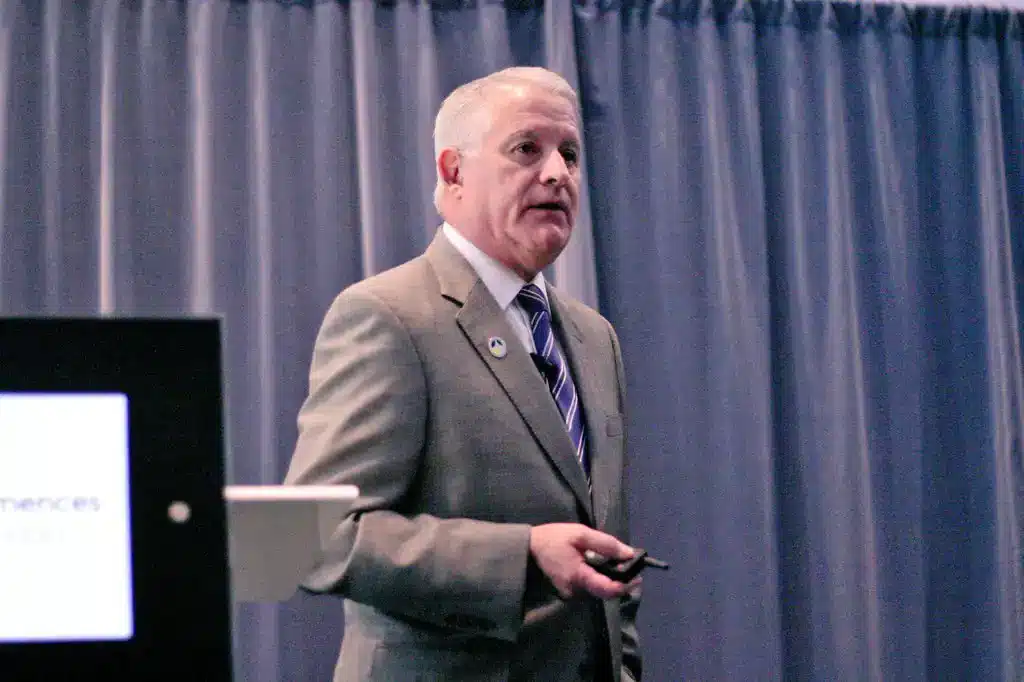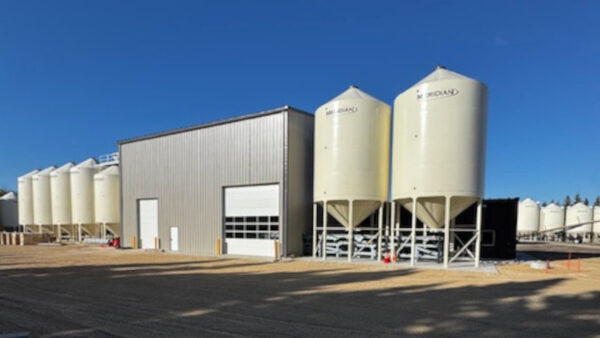The political environment in the U.S. is described by American Seed Trade Association President and CEO Andy LaVigne as a “full-on dumpster fire,” reflecting deep divisions and challenges in passing meaningful legislation.
Despite this, he emphasizes the need for the agricultural sector to remain engaged and proactive in driving policy and innovation.
“We have to drive these policies, maneuver through the mess, and ensure we can actually move forward,” he said today in his keynote address to the 200 attendees of the Seeds Canada Annual Conference in Edmonton, Alta.
LaVigne began by emphasizing the importance of owning the agricultural narrative.
“If we let somebody else tell our story, we’re not going to win,” he said, stressing the need for the agricultural community to be proactive in communicating its innovations and contributions.
He highlighted the crucial trade relationships between the U.S., Canada and Mexico. The political climate in North America plays a significant role in shaping agricultural policies and trade agreements. LaVigne pointed out the recent election of a new president in Mexico and the ongoing challenges with Mexico’s stance on GMOs, highlighting the importance of cooperation and dialogue between the neighboring countries.
In the U.S., the upcoming presidential election poses uncertainty for agricultural policies, he said.
“There is a way forward, and we need to figure out how to navigate through this. We need to find the adults in the room and move forward. I think we all deal with these frustrations, and unfortunately, we’re in a challenging cycle right now,” he said.
“We have a lot to address, but we must move forward — we can’t sit back and wait for the right people in Congress, the White House, or the EPA. We need to take action now and maneuver through the mess to ensure progress.”
LaVigne also addressed the broader geopolitical issues affecting agriculture, underscoring the role of food security in maintaining global stability.
“When people are hungry, unrest happens,” he said, emphasizing the interconnectedness of global stability and food security. He mentioned the ongoing conflicts in Ukraine, Russia, the Middle East, and Africa, highlighting their direct implications for the agricultural sector.
Innovation in agriculture is crucial for its future, and he praised Canada’s scientifically based policy on gene editing, stating, “Canada probably has the best scientifically based policy dealing with gene editing anywhere.”

Strengthening Research Innovation
Canada has a unique opportunity to redefine its position in the global market by focusing on innovation and investment, said Tyler McCann, who presented on the issue of Canada’s position in agriculture productivity research, and the risks of falling further behind.
“Currently, Canada is perceived as less globalized compared to other nations, which hinders its ability to attract significant investment and drive economic growth,” he said. “This perception is particularly detrimental to the agricultural sector, where research and development are crucial for competitiveness.”
The reality is stark: Canada lags behind in innovation. Our performance in generating and exporting intellectual property (IP) is subpar, particularly in the agricultural sector, he noted. Despite numerous anecdotal accounts and personal experiences highlighting this issue, a comprehensive strategy to address it remains elusive.
A critical analysis by the Agri-Food Economic Strategy Table in 2019 highlighted Canada’s competitive shortcomings, including the regulatory burden and the need for skills development, market access, and infrastructure improvements. A holistic approach is necessary, focusing not just on regulations but on how various elements of the system interact.
“Unfortunately, despite knowing what needs to be done, Canada has struggled to implement these changes effectively,” he said.
Canada’s current position is inadequate to tackle the complex challenges of today and the future, he went on to say. Peer countries are making serious commitments to science, research, and innovation, leaving Canada at risk of falling further behind. This is a fundamental issue that requires immediate and significant attention.
To address this, Canada needs to increase its R&D spending, particularly in agriculture. Drawing inspiration from NATO’s defense spending target, Canada should aim for 2% of the value of agricultural production to be invested in R&D, McCann said. This target is ambitious but necessary to catch up with global competitors. Achieving this would require an additional $700 million investment this year alone, a substantial but vital commitment.
Agriculture and Agri-Food Canada (AAFC) is already ahead in some areas, with its Science and Technology Branch showing a willingness to innovate, McCann added. AAFC’s new strategic plan emphasizes not just productivity but also adaptation to climate change, signalling a shift in priorities. However, this plan needs broader support and clearer articulation to ensure it drives meaningful change.
“One of the critical aspects of this strategy is reinforcing the public good role of AAFC. This means emphasizing upstream, foundational, and public-good agricultural research. A more collaborative and transparent approach, involving stakeholders across the ecosystem, is essential,” he said.
“This strategy should not be confined to the halls of AAFC but should encompass policies and programs across multiple departments.”
Learning from successful models like Protein Industries Canada, which leverages public and private investments, can offer valuable insights. These initiatives require collaboration and shared risk, fostering a more innovative and competitive environment, he said.
“Canada should adopt similar approaches across the agricultural sector, creating conditions that attract North American and global investments.”
To Move Forward, Industry Divisiveness Must be Dealt Address: Trish Jordan

A significant topic of discussion today was the Inclusive Standards Setting Body (ISSB), an acronym that seems to have multiple interpretations. However, the name itself is less important than its mission and goals.
The core aim of the ISSB is to serve as a unified voice representing the seed industry to regulators, providing coherent and collective recommendations, said report author Trish Jordan, who recently picked up the project was Erin Armstrong.
The ISSB is envisioned as an advisory body, offering policy and program recommendations to the Canadian Food Inspection Agency (CFIA).
“It’s not about making decisions but rather providing informed guidance. This could include a range of topics from new breeding innovations to sustainability practices,” Jordan said.
For the ISSB to be effective, it needs diverse representation from across the seed value chain, including stakeholders from various crop types and seed growers. A proposed structure might include 12 to 15 members to ensure balanced and manageable discussions.
In considering how to structure the ISSB, successful models like the CFIA’s Plant Breeders’ Rights Advisory Committee were examined.
“This committee has fostered a culture of openness and trust, which is crucial for making meaningful recommendations. Another model to consider is the WCC/RCC, which has been effective in the canola sector,” she added.
Financial support and sustainable funding are essential for an ISSB’s success. This could involve a mix of industry and government funding, along with dedicated staff resources. Additionally, it’s crucial to overcome existing divisiveness within the seed sector, particularly between Seeds Canada and CSGA members. Both organizations have expressed willingness to collaborate, but tangible steps need to be taken to bring them together.
Another consideration is rebranding the ISSB. The current name might not fully capture its inclusive and advisory nature. Changing the name could help reshape perceptions and foster a new beginning, Jordan said.
But, she said, industry rifts — specifically between Seeds Canada and the Canadian Seed Growers’ Association — need to be addressed for the advisory body to be effective.
“We need to bring these groups together and foster collective collaboration. I genuinely believe this is possible. Both organizations have expressed to me in numerous discussions that they are willing to explore this, but it hasn’t materialized yet,” she said.
“Why this hasn’t happened is still unclear to me. Overcoming this barrier is crucial. There was general agreement that the concept of an advisory body would help move beyond the perception of a single stakeholder — the seed growers — dominating the standard-setting and regulation processes.”
Staff efforts have been tried, but progress seems slow, she added.
“I strongly believe the seed industry needs to evolve through meaningful and respectful discussions, and we need to truly listen to one another.”












